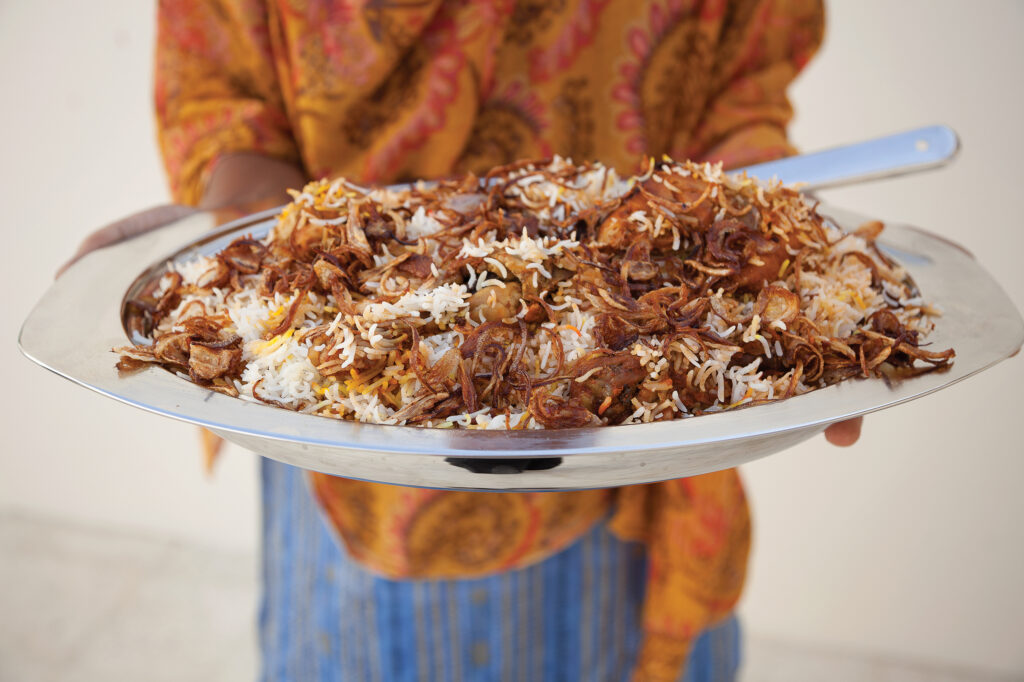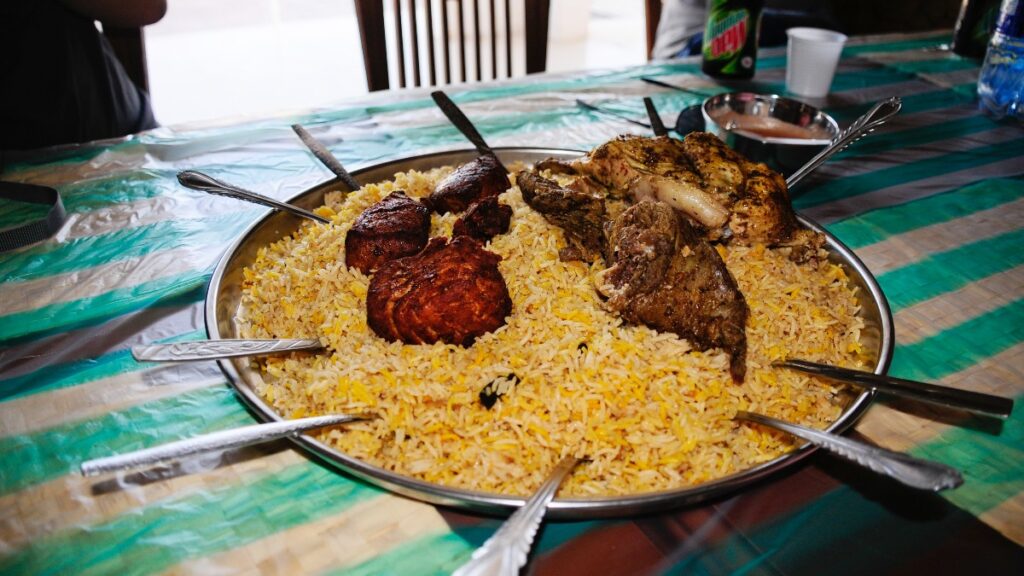Omani cuisine is not simply a collection of dishes passed down through generations. It is a living story of culture, family bonds, and heritage. In Oman, food holds a profound place in daily life, acting as both nourishment and a medium of connection. Each meal becomes more than just eating; it transforms into a moment of togetherness, storytelling, and celebration. From the warmth of freshly baked bread to the aromas of cardamom and saffron rising from traditional rice dishes, Omani cuisine represents the very soul of family life.
Across the Sultanate, people find pride in their culinary traditions. Recipes are shared between mothers and daughters, grandparents and grandchildren, symbolizing a deeper continuity of values, history, and family bonds. To understand Omani family life, one must first explore its food, for it reflects love, respect, and a strong cultural identity.
A Culinary Expression of Heritage
Omani cuisine carries within it centuries of history influenced by trade, migration, and geography. Positioned at a crossroads of Asia, Africa, and the Middle East, Oman has absorbed flavors and techniques from across continents. Yet, what makes its cuisine special is the way it blends these influences while preserving its authenticity.
For families, cooking and eating together is a way of remembering who they are and where they come from. A dish like shuwa, slow-cooked meat prepared during festive occasions, is not just a meal but a cultural event. Preparing it requires patience, cooperation, and knowledge passed down through time. In daily life, simpler yet equally significant dishes such as harees or rice with fish keep families close to their roots. The flavors remind every Omani of their land and heritage, no matter how modern life becomes.
The Central Role of Meals in Family Bonding
Food is often the centerpiece of family interactions in Oman. Mealtimes bring everyone together, from the youngest child to the eldest grandparent. Sitting on the floor around a shared dish creates an atmosphere of intimacy, reminding everyone of equality, humility, and love.
In many homes, meals are not eaten quickly or in isolation but enjoyed slowly with conversations, laughter, and reflections. Parents teach children manners at the dining mat how to share, respect elders, and appreciate the blessings of food. In this way, cuisine becomes a classroom of values, reinforcing the deep respect for family and community in Omani culture.

Daily Practices That Preserve Tradition
Though modernization has influenced lifestyle in Oman, traditional food practices remain deeply embedded in daily routines. Families still bake traditional breads such as khubz rakhal, a thin crispy bread, often eaten with honey or dates at breakfast. Lunch, considered the main meal, commonly features rice, meat, or fish accompanied by aromatic spices.
The preparation of meals often involves collaboration. Mothers teach their children how to prepare ingredients, while fathers may help during outdoor cooking for larger gatherings. Grandparents often share stories while younger generations learn recipes by watching and participating. This daily engagement with food ensures that traditions are not only remembered but actively lived.
The Role of Hospitality and Sharing
Hospitality is one of the strongest values in Omani culture, and cuisine is at its core. Families take pride in welcoming guests with generosity, often offering dishes like maqbous or fresh dates and coffee. In doing so, they strengthen family ties and build trust within the community.
Daily life in Omani families often includes preparing extra portions of food in case unexpected guests arrive. This practice reflects the spirit of abundance and giving. Children grow up observing this tradition, learning that sharing food is not just kindness but an essential cultural responsibility.
Festivals and Celebrations Around Food
Festivals such as Eid are times when Omani families come together in even stronger ways. Traditional dishes like shuwa are prepared in large quantities, with entire families contributing to the cooking process. The meat, marinated with local spices, is wrapped in banana or palm leaves and cooked underground for long hours.
These celebrations are more than religious or social gatherings they are also food rituals that bring families closer. Preparing, waiting, and finally sharing the meal strengthens bonds and creates cherished memories. Children often associate festive times with the joy of helping in the kitchen, learning that food is a vital part of cultural identity and family love.
Symbolism in Omani Ingredients
Every ingredient in Omani cuisine carries meaning. Dates, for instance, are not only a staple food but a symbol of hospitality and blessing. Rice represents abundance, while spices such as cardamom, saffron, and cinnamon express the richness of Oman’s history as a trading nation.
In family life, the use of these ingredients is deliberate and thoughtful. Preparing a dish with the right blend of spices shows care and respect for loved ones. The taste becomes familiar and comforting, a reminder that family is the heart of life. These symbolic aspects make Omani cuisine not just delicious but also deeply meaningful.
Teaching the Next Generation Through Food
For Omani families, teaching children how to cook traditional dishes is a way of ensuring cultural continuity. Cooking lessons often begin informally children watch their elders mix spices, stir pots, or knead dough. Over time, they participate in the process, learning the importance of patience, precision, and love in preparing food.
Through these teachings, children gain more than culinary skills. They absorb lessons about gratitude, sharing, and resilience. Every dish becomes a silent teacher, connecting generations and ensuring that traditions do not fade with time.

Balancing Modern Influences With Tradition
Like many nations, Oman faces the influence of globalization and fast food culture. Urban families sometimes find themselves drawn to modern convenience. However, Omani cuisine continues to remain central to family life. Even as people try new dishes, traditional food is never abandoned. Instead, families find balance by blending modern dining habits with traditional meals.
In daily life, a family may enjoy international foods, but weekends and gatherings often return to Omani classics. This balance reflects resilience an ability to adapt while preserving identity. The dining table becomes a place where old and new coexist, showing that Omani families value both progress and heritage.
Food as a Reflection of Love and Care
Perhaps the most powerful role of Omani cuisine in daily family life is its expression of love. Every carefully prepared dish is a gesture of care. Mothers waking early to prepare fresh bread, fathers bringing home the best fish, or grandparents offering dates and coffee all are acts of love spoken through food.
This love is not limited to family members alone. Neighbors and friends often share dishes with one another, spreading warmth throughout the community. In this way, Omani cuisine nourishes not only the body but also the spirit, building bridges of connection and kindness every day.
The Future of Omani Cuisine in Family Life
Looking ahead, Omani cuisine will continue to evolve, influenced by changing times, global connections, and technological advancements. Yet its role in family life remains strong. As long as families gather to share meals, teach children traditions, and express love through food, Omani cuisine will remain a vibrant part of daily living.
Modern initiatives to promote local food culture, along with a renewed interest among youth in traditional recipes, ensure that this heritage will not be lost. The dining mat will always be a place of belonging, and Omani cuisine will continue to play its timeless role in shaping family bonds and cultural identity.
Conclusion
Omani cuisine is far more than a daily necessity. It is a symbol of love, culture, and unity. Every dish carries a story, every spice carries history, and every meal strengthens the threads that bind families together. In the heart of every Omani home, cuisine remains a powerful force, reminding people of their roots and nurturing their bonds.
Through traditions of cooking, sharing, and celebrating, Omani cuisine continues to play a profound role in daily family life. It connects generations, preserves identity, and spreads warmth in every home. Ultimately, the role of Omani cuisine goes beyond the kitchen it is the flavor of family, the essence of heritage, and the heartbeat of Omani culture.
Also Read – Modern Cafes Transform Oman’s Lifestyle with Vibrant Experiences



